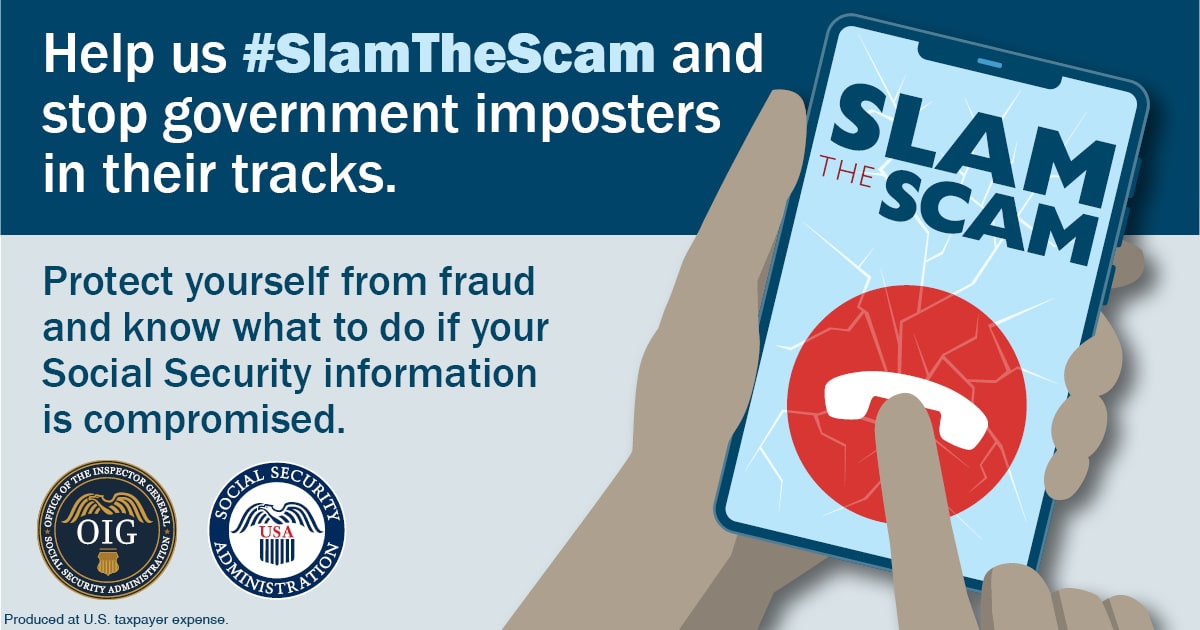5 Questions Seniors Can Ask to Spot a Social Security Fraud Scam

Social security and other government benefits are a huge part of many seniors’ lives. Unfortunately, this means criminals often disguise themselves as these programs to take advantage of those over 65. So, to assist in protecting seniors, the Social Security Administration (SSA) instituted National Slam the Scam Day in 2020. This year, Slam the Scam Day was held on March 10th and focused on common scams like illegitimate requests for payment using gift cards and how seniors can spot a social security fraud scam.
Although just one annual day won’t stop scammers in their tracks, just being aware of these fraudulent behaviors is a huge help in avoiding them. We’re encouraging seniors to know the signs of a scam and how to verify if a call about your benefits is coming from a trusted source.
How to Spot a Social Security Fraud Scam
Revisiting scam-slamming strategies year after year is essential because scammers’ tactics change so often. Let’s dive in and explore how you can spot the signs of a scam.
1. Who is contacting you?
Scammers usually present themselves as someone you trust. Those targeting seniors often pretend to be the Social Security Administration or the IRS. Their emails might look convincing and include government logos, seals, signatures or even employee bios. How can you tell them apart from real communications?
Government agencies will always contact you by mail first. If you haven’t received a notice in the mail, there’s a high likelihood the real agency isn’t contacting you. Even if an email looks official, if this is the first time you’re being contacted about the issue, you’re probably the target of a scam.
2. Are they asking for personal information?
Scammers need your personal information for their plans to succeed. This is why they ask prying questions about your sensitive details. Government agencies will confirm to whom they’re speaking if you contact them by telephone, but they won’t call and ask for that information.
An actual government entity will NOT ask you for any of the following
- PIN numbers,
- Passwords,
- Bank codes, or
- Other identifying data.
So, what if someone calling themselves the SSA does ask for this information? You’re most likely talking to a scammer. They may even say they need personal information to activate your benefits, but be wary. Don’t provide any details, just hang up.
At any time, if you’re unsure about who you’re speaking to, put your safety first. You can always reach out to the real agency on your own to verify.
3. Are they making threats or pressuring you?
Fraudsters often use urgency and high stakes to manipulate seniors into disclosing personal information, sending them money or both. A scammer might threaten to suspend your social security number, freeze your bank account, warn you of impending legal issues or even threaten that you’ll be arrested.
Before you respond, take a step back and remember that all government agencies in the United States have to abide by due process. This means they don’t threaten you with dire consequences if you don’t act urgently. Any real issue you may have will be resolved through a predetermined process that is set down in law. If someone tries to scare you into taking immediate action, they’re a scammer.
4. How are they asking for payment?
A criminal might be looking for your personal information—which they will then use for identity theft or to access your bank account. They also might ask for money directly! Scammers often pretend you need to pay a fine or fee as a way to hide their more sinister intention.
Government agencies do NOT accept money in the following forms
- gift cards,
- prepaid debit cards,
- wire transfers,
- cryptocurrency, or
- sending cash through the mail.
If someone claiming to be a government agency asks you to send money using any of these methods, it’s certainly a scam.
5. What do I do if I suspect a scam?
If you think a phone call or email might be a scam, don’t engage! Hang up the phone, and don’t respond to the message. Scam artists are convincing. Cutting off all communication with them is the best way to keep yourself safe.
Then, tell someone! This website can help you identify the appropriate government agency for your situation. Reporting helps officials gather important data about how scams are being run in your area, and might even help them catch the scammers!
To stay informed on issues affecting seniors, sign up for our newsletter or contact us today.

